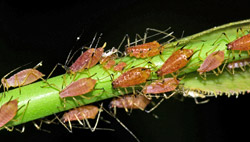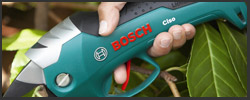YOU ARE HERE Pest Watch > Aphid control
Pest Watch
Aphid control
 Aphids, blackfly, greenfly are probably the most widespread plant pest problem in the garden. They will attack a wide range of garden and indoor plants - from annuals, perennials and vegetables to trees, shrubs, climbers, roses and fruit. Gardeners with aphid problems may need to take steps to control them.
Aphids, blackfly, greenfly are probably the most widespread plant pest problem in the garden. They will attack a wide range of garden and indoor plants - from annuals, perennials and vegetables to trees, shrubs, climbers, roses and fruit. Gardeners with aphid problems may need to take steps to control them.
Some species are specific to a plant or group of plants, and some produce characteristic damage to the plant; bean blackfly, plum leaf-curling aphid, mealy cabbage aphid and currant blister aphid are just a few examples. Woolly aphid covers itself in a cotton wool-like substances that provides protection against predators and contact insecticides.
For most of the year, the often huge aphid colonies are made up of wingless females that give birth to live young - usually in huge numbers and very quickly. Winged aphids develop at certain times and fly to another plant. Most aphids overwinter as eggs, but some species remain as active aphids, especially in mild winters or on indoor plants.
Some aphid species go through an annual lifecycle that involves two different host plants. Eggs overwinter on one plant, hatch and feed on the young foliage in spring then winged forms are produced that fly to the other host where they spend the summer.
Not only do aphids suck plant sap, they excrete a sugary substance called honeydew - which attracts sooty moulds that grow on the honeydew - and some aphids can transmit plant viruses when they move from one plant to another.
Aphid, blackfly, greenfly control
Luckily, aphids have many natural enemies - including ladybirds, hoverfly larvae, lacewing larvae and several parasitic wasps. If your garden is short of these, you can now buy them from biological control suppliers. See suppliers.
The best method of control is to keep a regular/daily in summer eye on susceptible plants and squash the one or two aphids you see before they build up into huge colonies. In this instance, wiping them off with a damp sponge or moist tissue, or blasting them with water from a hosepipe, pressure sprayer or even pressure washer, is a quick and chemical-free way of controlling them.
There are a number of chemical pesticides that you can use on aphids, blackfly and greenfly. Those sold as 'organic' or 'natural' are contact insecticides, which means you have to hit the aphid to kill it - miss even one and it will soon develop into a colony of hundreds/thousands. This means you need to check plants regularly - daily in summer.
Provanto Ultimate Bug Killer, Provanto Ultimate Fruit & Vegetable Bug Killer and Resolva Bug Killer kill on contact and can provide further protection for up to two weeks.
The systemic insecticides Provanto Smart Bug Killer and BugClear Ultra provide the best control. They also kill on contact, but are also taken inside the plant where they go on to protect against further attack for several weeks. There are only certain edible crops that they can be used on; check the label before using.
Biological controls are available for plants growing in greenhouses or conservatories from several mail order of suppliers.
Use plant protection products safely. Always read the label and product information before use.
If you want to know more, or if you've got a gardening problem you need help with, then send an e-mail to: info@gardenforumhorticulture.co.uk
Problems with slugs & snails, scale insect, vine weevil, whitefly or lily beetle?


